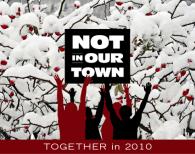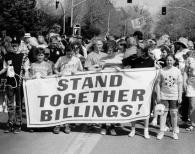By DeJuan Marcell MitchellIt was not until I got to college that I discovered a little bit more about DeJuan Marcell Mitchell.
support

Today we uploaded three new files to the Not In Our Town Action Kit: Materials from West Virginia's successful multi-pronged action campaign titled, West Virginia: No Place for Hate.
Though this counter-protest occured in 2010, we believe these resources remain relevant and inspiring today. West Virginia leaders came together after Fred Phelps' Westboro hate group announced it would picket Catholic and Jewish institutions in the two towns, a local university, and a mine where more than a dozen miners had recently lost their lives.
The Not In Our Town Action Kit is a hidden gem on NIOT.org, compiling resources from communities standing up to hate and intolerance. In addition to these materials from West Virginia, you will find:

Why should you give to Not In Our Town?
We asked our donors and NIOT Network members, and here's what they have to say:
"After the firebombing of our synagogue in Sacramento I had the taste of dust in my mouth, but the community response helped me move on. You have to give back." -- Rabbi Brad Bloom
“We are in a tough economic period and all around us other countries are looking at the US in a different light. With jobs and money scarce, charity and compassion for The Other seems to fall away in place of "where's mine?" or a need to exact payment for perceived or real slights. All too often that payment comes in a violent envelope. NIOT is critical in how it addresses local acts that detract us from being healthy global citizens." --Susan Estes, The Athena Fund
"Not In Our Town is an integral message of hope, a beacon in world that too often gets bogged down in the petty and the misunderstood. We need to continue this vital outreach to appeal to what our fellow Illinoisan, Abraham Lincoln, called 'the better angels of our nature.'" --Mike Matejka

On Oct. 2, Stanford University’s Jewish community celebrated the first night of Sukkot, the harvest festival that commemorates the Biblical story of the Israelites living in booths in the desert after their exodus from Egypt. As is traditional during the eight-day holiday, Jewish students and faculty at the Palo Alto campus ate dinner inside a sukkah, a three-sided hut built to observe the holiday.

